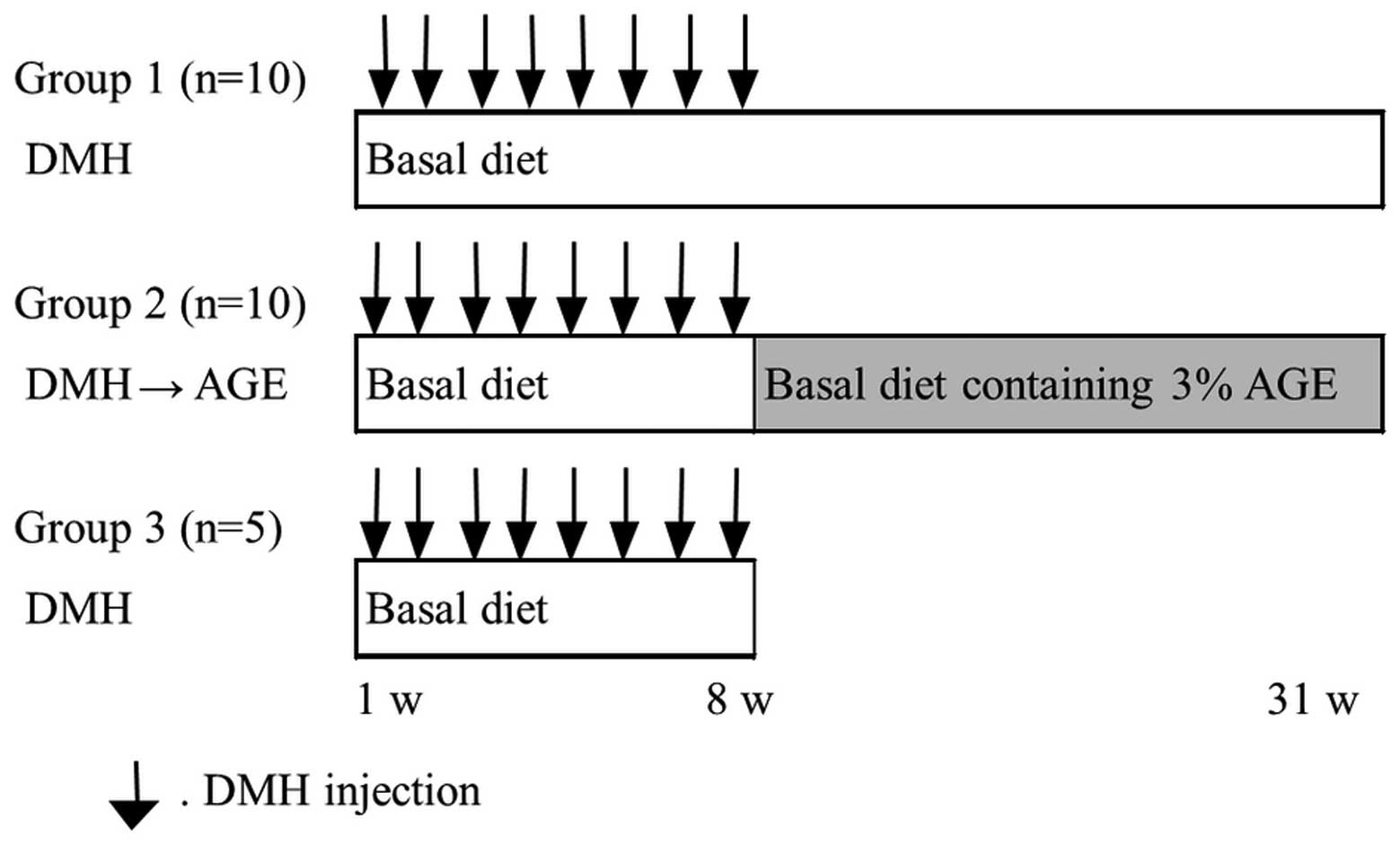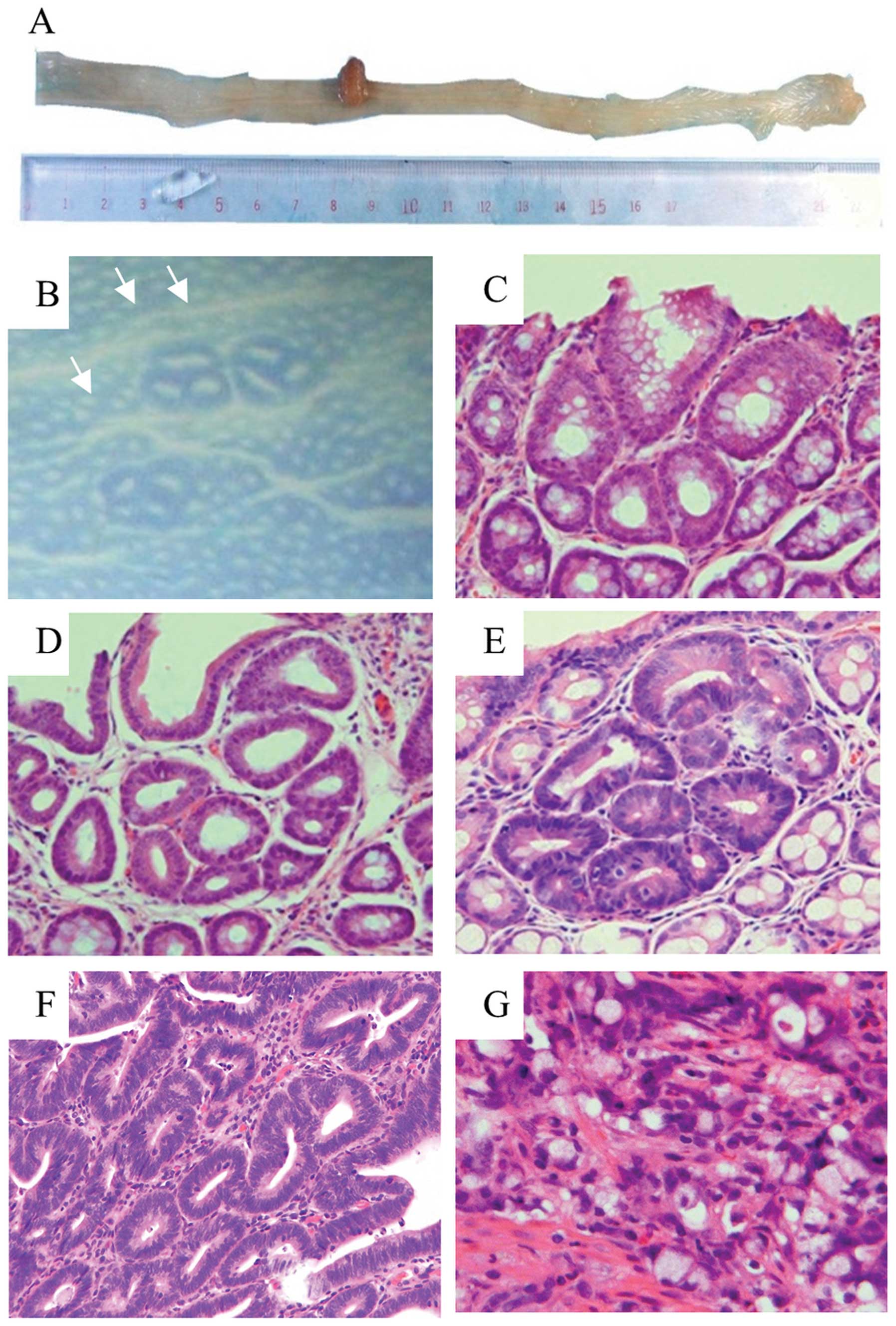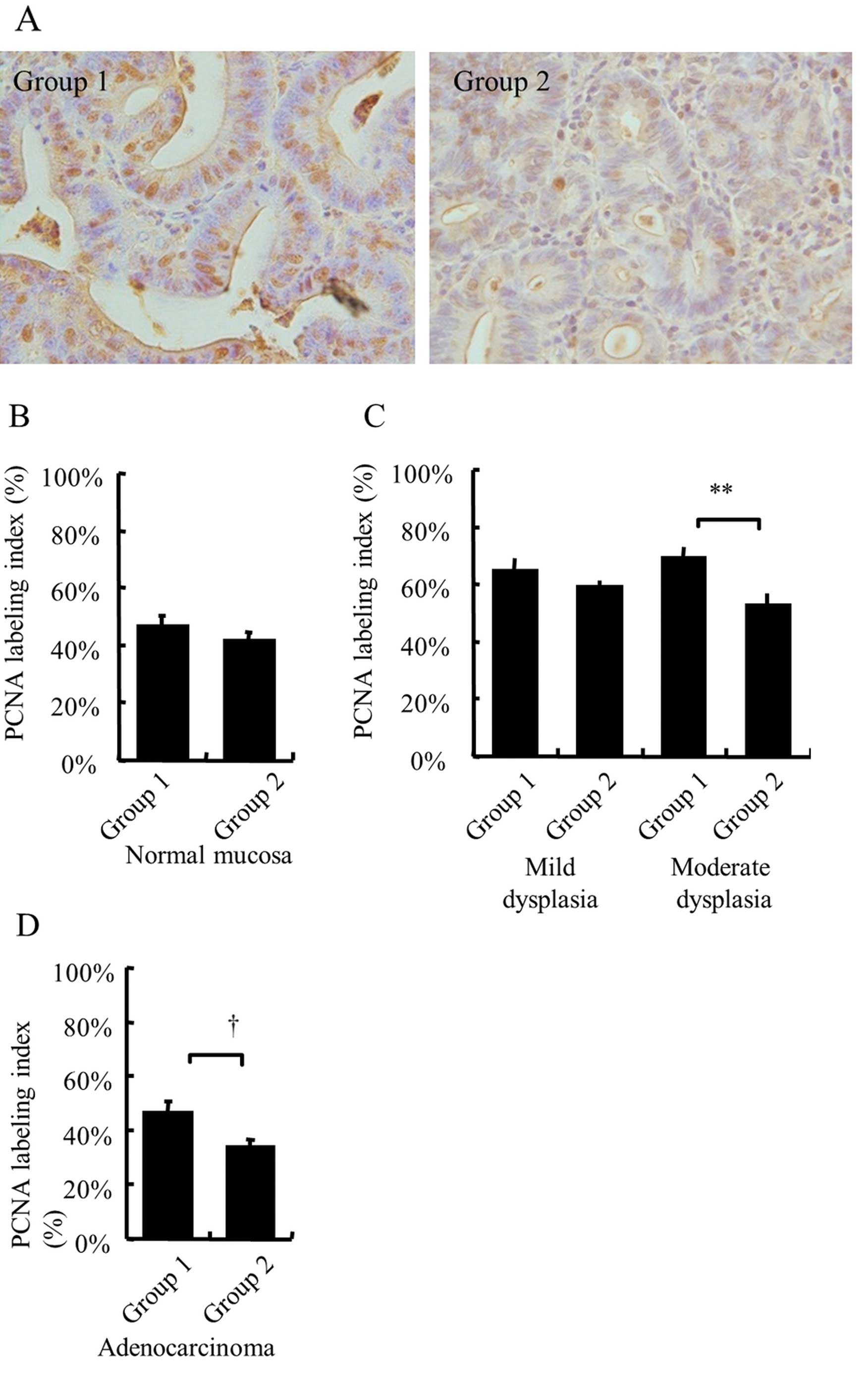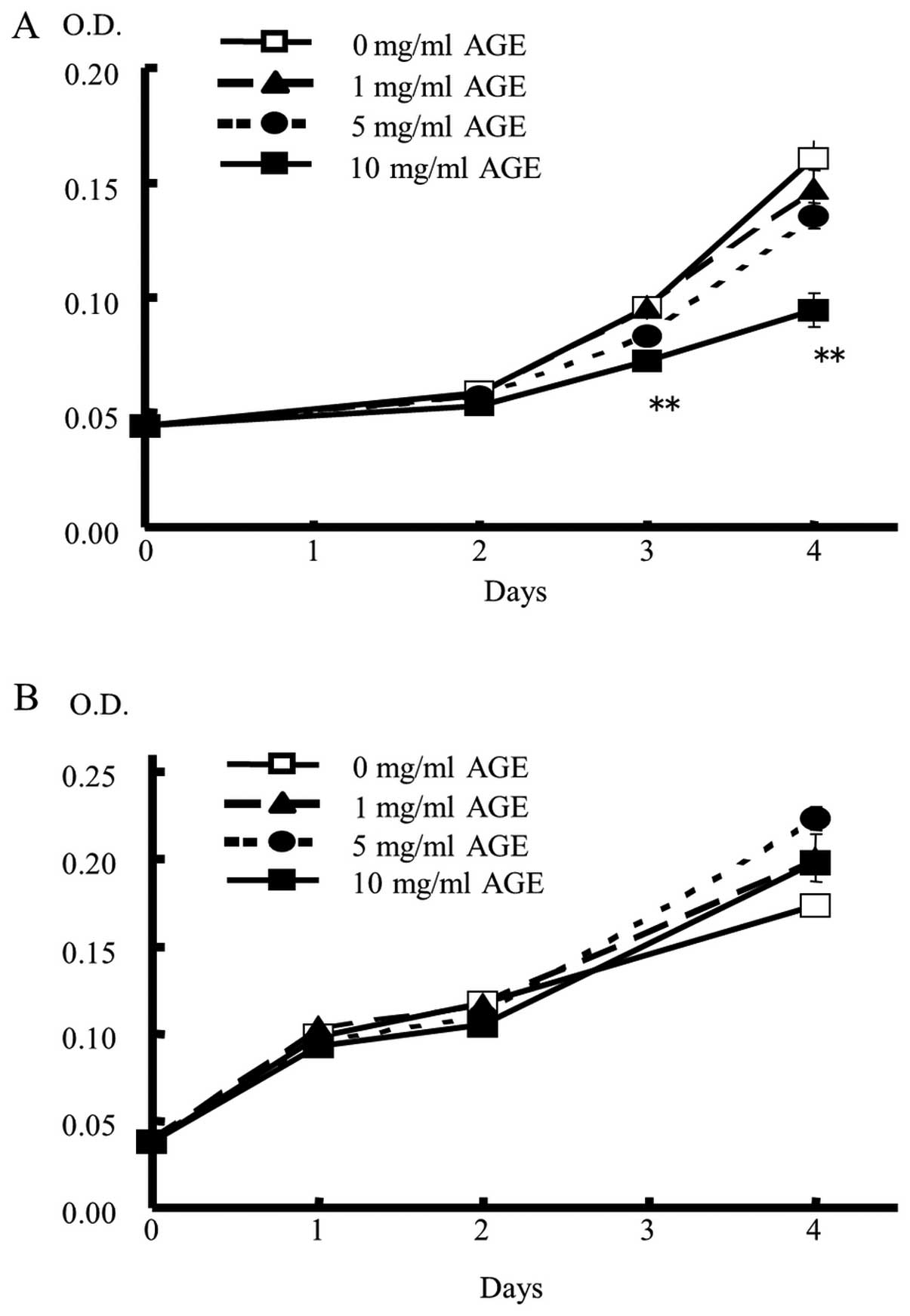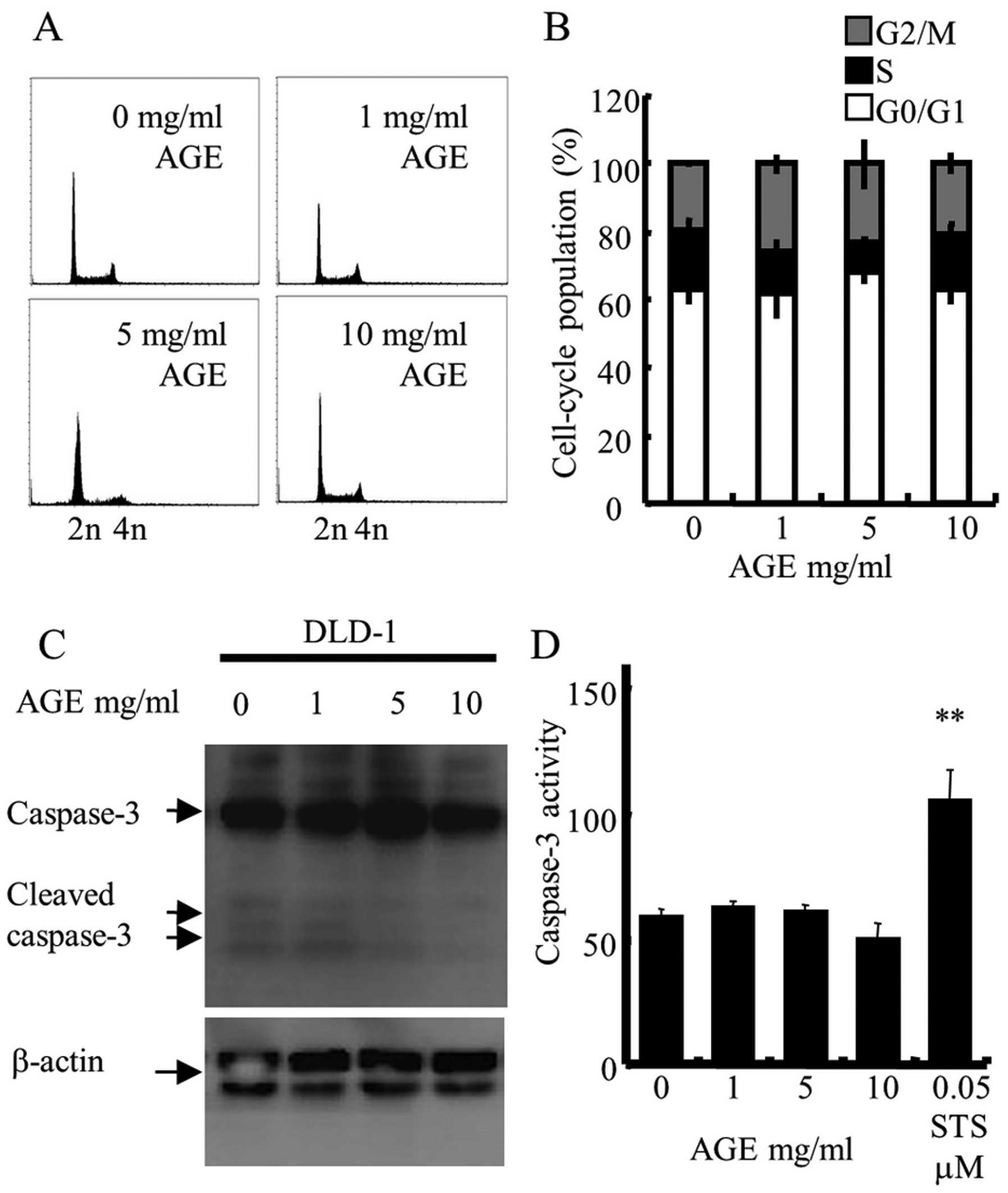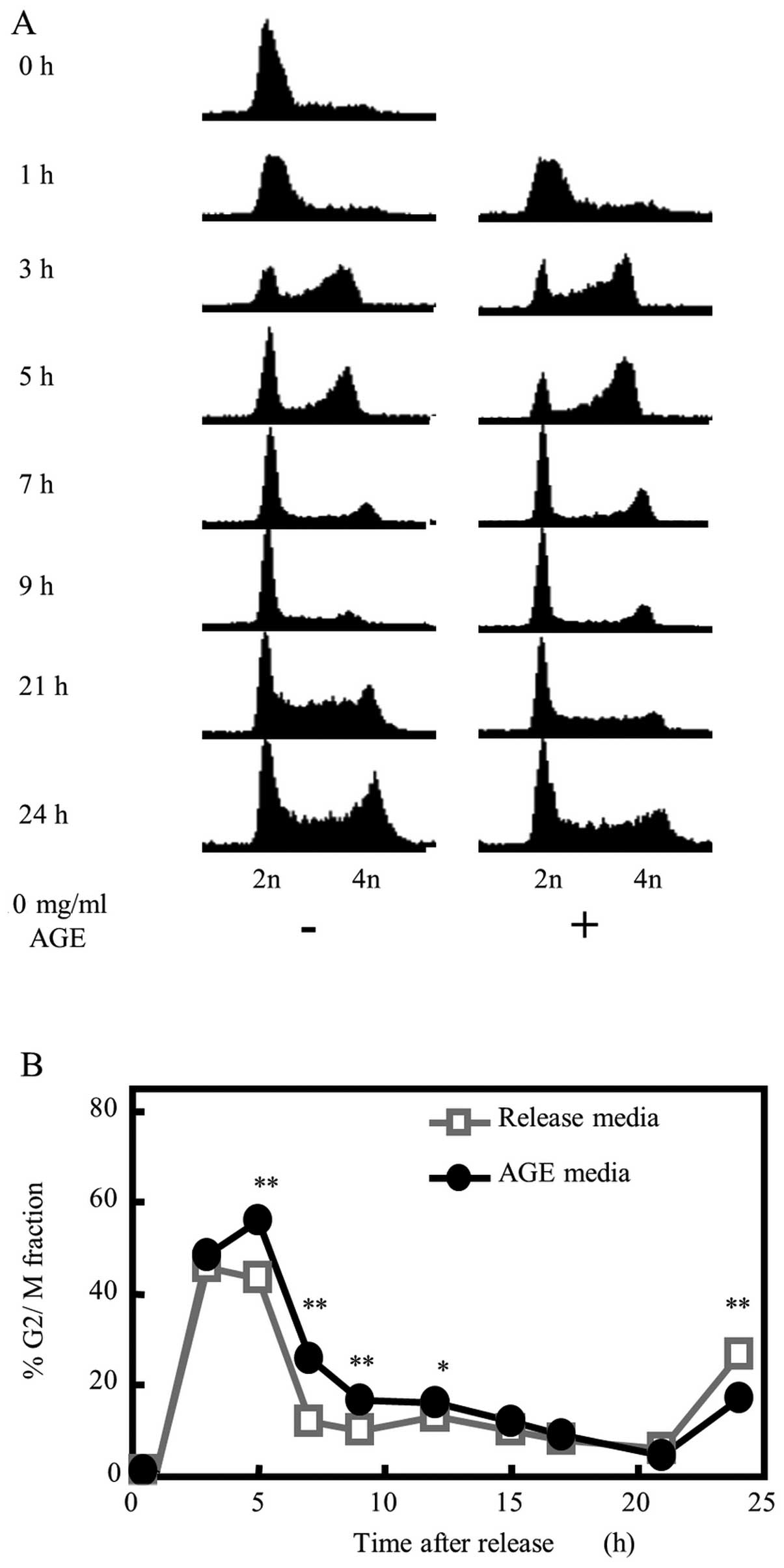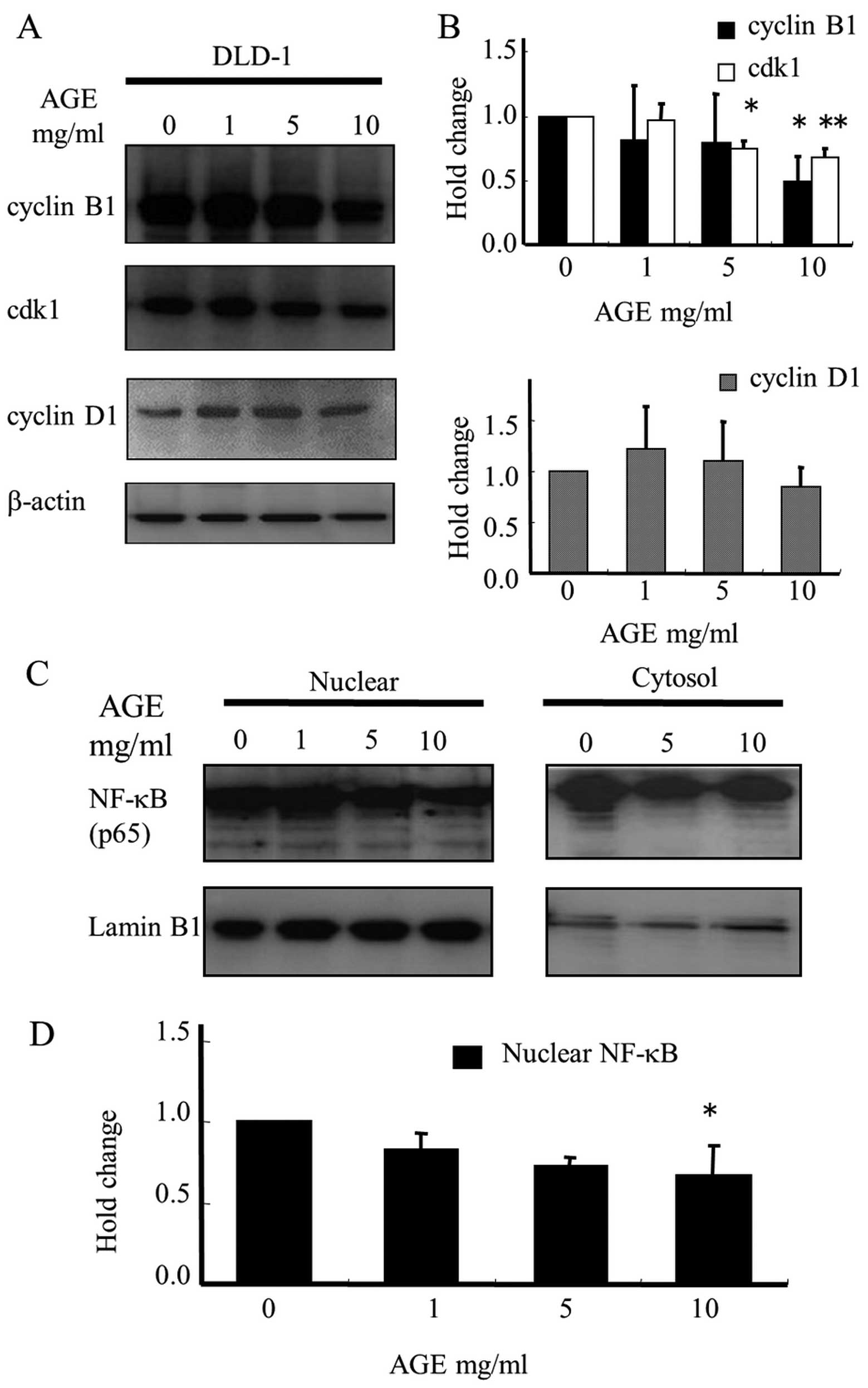|
1
|
Fleischauer AT, Poole C and Arab L: Garlic
consumption and cancer prevention: meta-analyses of colorectal and
stomach cancers. Am J Clin Nutr. 72:1047–1052. 2000.PubMed/NCBI
|
|
2
|
Gao CM, Takezaki T, Ding JH, Li MS and
Tajima K: Protective effect of allium vegetables against both
esophageal and stomach cancer: a simultaneous case-referent study
of a high-epidemic area in Jiangsu Province, China. Jpn J Cancer
Res. 90:614–621. 1999. View Article : Google Scholar : PubMed/NCBI
|
|
3
|
Sumiyoshi H and Wargovich MJ:
Chemoprevention of 1,2-dimethylhydrazine-induced colon cancer in
mice by naturally occurring organosulfur compounds. Cancer Res.
15:5084–5087. 1990.
|
|
4
|
Hatono S, Jimenez A and Wargovich MJ:
Chemopreventive effect of S-allylcysteine and its relationship to
the detoxification enzyme glutathione S-transferase.
Carcinogenesis. 17:1041–1044. 1996. View Article : Google Scholar : PubMed/NCBI
|
|
5
|
Wang X, Jiao F, Wang QW, et al: Aged black
garlic extract induces inhibition of gastric cancer cell growth in
vitro and in vivo. Mol Med Rep. 5:66–72. 2012.
|
|
6
|
Xiao D, Pinto JT, Soh JW, Deguchi A, et
al: Induction of apoptosis by the garlic-derived compound
S-allylmercaptocysteine (SAMC) is associated with microtubule
depolymerization and c-Jun NH(2)-terminal kinase 1 activation.
Cancer Res. 63:6825–6837. 2003.PubMed/NCBI
|
|
7
|
Knowles LM and Milner JA: Depressed p34
cdc2 kinase activity and G2/M phase arrest induced by diallyl
disulfide in HCT-15 cells. Nutr Cancer. 30:169–174. 1998.
View Article : Google Scholar
|
|
8
|
Shirin H, Pinto JT, Kawabata Y, et al:
Antiproliferative effects of S-allylmercaptocysteine on colon
cancer cells when tested alone or in combination with sulindac
sulfide. Cancer Res. 61:725–731. 2001.PubMed/NCBI
|
|
9
|
Hosono T, Fukao T, Ogihara J, Ito Y, Shiba
H, Seki T and Ariga T: Diallyl trisulfide suppresses the
proliferation and induces apoptosis of human colon cancer cells
through oxidative modification of beta-tubulin. J Biol Chem.
280:41487–41493. 2005. View Article : Google Scholar : PubMed/NCBI
|
|
10
|
Ban JO, Yuk DY, Woo KS, et al: Inhibition
of cell growth and induction of apoptosis via inactivation of
NF-kappaB by a sulfur-compound isolated from garlic in human colon
cancer cells. J Pharmacol Sci. 104:374–383. 2007. View Article : Google Scholar : PubMed/NCBI
|
|
11
|
Sriram N, Kalayarasan S, Ashokkumar P,
Sureshkumar A and Sudhandiran G: Diallyl sulfide induces apoptosis
in Colo 320 DM human colon cancer cells: involvement of caspase-3,
NF-kappaB, and ERK-2. Mol Cell Biochem. 311:157–165. 2008.
View Article : Google Scholar : PubMed/NCBI
|
|
12
|
Liang D, Qin Y, Zhao W, et al:
S-allylmercaptocysteine effectively inhibits the proliferation of
colorectal cancer cells under in vitro and in vivo conditions.
Cancer Lett. 310:69–76. 2011. View Article : Google Scholar : PubMed/NCBI
|
|
13
|
Dong M, Yang G, Liu H, Liu X, Lin S, Sun D
and Wang Y: Aged black garlic extract inhibits HT29 colon cancer
cell growth via the PI3K/Akt signaling pathway. Biomed Rep.
2:250–254. 2014.PubMed/NCBI
|
|
14
|
Soni KB, Lahiri M, Chackradeo P, Bhide SV
and Kuttan R: Protective effect of food additives on
aflatoxin-induced mutagenicity and hepatocarcinogenicity. Cancer
Lett. 115:129–133. 1997. View Article : Google Scholar : PubMed/NCBI
|
|
15
|
Knasmüller S, de Martin R, Domjan G and
Szakmary A: Studies on the antimutagenic activities of garlic
extract. Environ Mol Mutagen. 13:357–365. 1989. View Article : Google Scholar : PubMed/NCBI
|
|
16
|
Amagase H and Milner JA: Impact of various
sources of garlic and their constituents on
7,12-dimethylbenz[a]anthracene binding to mammary cell DNA.
Carcinogenesis. 14:1627–1631. 1993. View Article : Google Scholar : PubMed/NCBI
|
|
17
|
Sparnins VL, Barany G and Wattenberg LW:
Effects of organosulfur compounds from garlic and onions on
benzo[a] pyrene-induced neoplasia and glutathione S-transferase
activity in the mouse. Carcinogenesis. 9:131–134. 1988. View Article : Google Scholar : PubMed/NCBI
|
|
18
|
Tadi PP, Tee RW and Lau BH: Organosulfur
compounds of garlic modulate mutagenesis, metabolism, and DNA
binding of aflatoxin B1. Nutr Cancer. 15:87–95. 1991. View Article : Google Scholar : PubMed/NCBI
|
|
19
|
Perše M and Cerar A: Morphological and
molecular alterations in 1,2 dimethylhydrazine and azoxymethane
induced colon carcinogenesis in rats. J Biomed Biotechnol.
2011:1–14. 2011. View Article : Google Scholar
|
|
20
|
Tammariello AE and Milner JA: Mouse models
for unraveling the importance of diet in colon cancer prevention. J
Nutr Biochem. 21:77–88. 2010. View Article : Google Scholar : PubMed/NCBI
|
|
21
|
Chen J and Huang XF: The signal pathways
in azoxymethane-induced colon cancer and preventive implications.
Cancer Biol Ther. 8:1313–1317. 2009. View Article : Google Scholar : PubMed/NCBI
|
|
22
|
Takahashi M and Wakabayashi K: Gene
mutations and altered gene expression in azoxymethane-induced colon
carcinogenesis in rodents. Cancer Sci. 95:475–480. 2004. View Article : Google Scholar : PubMed/NCBI
|
|
23
|
Lijinsky W, Saavedra JE and Reuber MD:
Organ-specific carcinogenesis in rats by methyl- and
ethylazoxyalkanes. Cancer Res. 45:76–79. 1985.PubMed/NCBI
|
|
24
|
Tanaka S, Haruma K, Kunihiro M, et al:
Effects of aged garlic extract (AGE) on colorectal adenomas: a
double-blinded study. Hiroshima J Med Sci. 53:39–45. 2004.
|
|
25
|
Matsuura N, Miyamae Y, Yamane K, et al:
Aged garlic extract inhibits angiogenesis and proliferation of
colorectal carcinoma cells. J Nutr. 136(Suppl 3): 842–846.
2006.
|
|
26
|
Kyo E, Uda N, Kasuga S and Itakura Y:
Immunomodulatory effects of aged garlic extract. J Nutr.
131:S1075–S1079. 2006.
|
|
27
|
Morihara N, Sumioka I, Moriguchi T, Uda N
and Kyo E: Aged garlic extract enhances production of nitric oxide.
Life Sci. 71:509–517. 2002. View Article : Google Scholar : PubMed/NCBI
|
|
28
|
Morihara N, Ushijima M, Kashimoto N, et
al: Aged garlic extract ameliorates physical fatigue. Biol Pharm
Bull. 29:962–966. 2006. View Article : Google Scholar : PubMed/NCBI
|
|
29
|
Katsuki T, Hirata K, Ishikawa H, Matsuura
N, Sumi S and Itoh H: Aged garlic extract has chemopreventative
effects on 1,2-dimethylhydrazine-induced colon tumors in rats. J
Nutr. 136(Suppl 3): 847–851. 2006.
|
|
30
|
McLellan EA, Medline A and Bird RP:
Sequential analyses of the growth and morphological characteristics
of aberrant crypt foci: putative preneoplastic lesions. Cancer Res.
51:5270–5274. 1991.PubMed/NCBI
|
|
31
|
Pindborg JJ, Reichart PA, Smith CJ and
Waal I: Histological typing of cancer and precancer of the oral
mucosa. 2nd edition. WHO; Geneva: pp. 21–31. 1997
|
|
32
|
Ferreira CG, Epping M, Kruyt FA and
Giaccone G: Apoptosis: target of cancer therapy. Clin Cancer Res
2002. 8:2024–2034. 2002.
|
|
33
|
Alnemri ES, Livingston DJ, Nicholson DW,
Salvesen G, Thornberry NA, Wong WW and Yuan J: Human ICE/CED-3
protease nomenclature. Cell. 87:1711996. View Article : Google Scholar : PubMed/NCBI
|
|
34
|
Muschel RJ, Zhang HB, Iliakis G and
McKenna WG: Cyclin B expression in HeLa cells during the G2 block
induced by ionizing radiation. Cancer Res. 51:5113–5117.
1991.PubMed/NCBI
|
|
35
|
Metting NF and Little JB: Transient
failure to dephosphorylate the cdc2-cyclin B1 complex accompanies
radiation-induced G2-phase arrest in HeLa cells. Radiat Res.
143:286–292. 1995. View
Article : Google Scholar : PubMed/NCBI
|
|
36
|
Kao GD, McKenna WG, Maity A, Blank K and
Muschel RJ: Cyclin B1 availability is a rate-limiting component of
the radiation-induced G2 delay in HeLa cells. Cancer Res.
57:753–758. 1997.PubMed/NCBI
|
|
37
|
Azzam EI, de Toledo SM, Gooding T and
Little JB: Intercellular communication is involved in the bystander
regulation of gene expression in human cells exposed to very low
fluences of alpha particles. Radiat Res. 150:497–504. 1998.
View Article : Google Scholar : PubMed/NCBI
|
|
38
|
Guo G, Yan-Sanders Y, Lyn-Cook BD, et al:
Manganese superoxide dismutase-mediated gene expression in
radiation-induced adaptive responses. Mol Cell Biol. 23:2362–2378.
2003. View Article : Google Scholar : PubMed/NCBI
|
|
39
|
Ozeki M, Tamae D, Hou DX, Wang T, Lebon T,
Spitz DR and Li JJ: Response of cyclin B1 to ionizing radiation:
regulation by NF-kappaB and mitochondrial antioxidant enzyme MnSOD.
Anticancer Res. 24:2657–2663. 2004.PubMed/NCBI
|
|
40
|
Herman-Antosiewicz A, Powolny AA and Singh
SV: Molecular targets of cancer chemoprevention by garlic-derived
organo-sulfides. Acta Pharmacol Sin. 28:1355–1364. 2007. View Article : Google Scholar : PubMed/NCBI
|
|
41
|
Pretlow TP1, Cheyer C and O’Riordan MA:
Aberrant crypt foci and colon tumors in F344 rats have similar
increases in proliferative activity. Int J Cancer. 56:599–602.
1994. View Article : Google Scholar : PubMed/NCBI
|
|
42
|
Hur K, Kim JR, Yoon BI, Lee JK, Choi JH,
Oh GT and Kim DY: Overexpression of cyclin D1 and cyclin E in
1,2-dimethylhydrazine dihydrochloride-induced rat colon
carcinogenesis. J Vet Sci. 1:121–126. 2000.
|
|
43
|
Janakiram NB, Mohammed A, Qian L, Choi CI,
Steele VE and Rao CV: Chemopreventive effects of RXR-selective
rexinoid bexarotene on intestinal neoplasia of Apc(Min/+) mice.
Neoplasia. 14:159–168. 2012.PubMed/NCBI
|
|
44
|
Powolny AA and Singh SV: Multitargeted
prevention and therapy of cancer by diallyl trisulfide and related
Allium vegetable-derived organosulfur compounds. Cancer Lett.
269:305–314. 2008. View Article : Google Scholar : PubMed/NCBI
|
|
45
|
Pai MH, Kuo YH, Chiang EP and Tang FY:
S-Allylcysteine inhibits tumour progression and the
epithelial-mesenchymal transition in a mouse xenograft model of
oral cancer. Br J Nutr. 14:28–38. 2012. View Article : Google Scholar
|
|
46
|
Xiao D, Vogel V and Singh SV: Benzyl
isothiocyanate-induced apoptosis in human breast cancer cells is
initiated by reactive oxygen species and regulated by Bax and Bak.
Mol Cancer Ther. 5:2931–2945. 2006. View Article : Google Scholar : PubMed/NCBI
|
|
47
|
Ryu DS, Kim SH and Lee DS:
Anti-proliferative effect of polysaccharides from Salicornia
herbacea on induction of G2/M arrest and apoptosis in human colon
cancer cells. J Microbiol Biotechnol. 19:1482–1489. 2009.
View Article : Google Scholar : PubMed/NCBI
|
|
48
|
Huang S, Pettaway CA, Uehara H, Bucana CD
and Fidler IJ: Blockade of NF-kappaB activity in human prostate
cancer cells is associated with suppression of angiogenesis,
invasion, and metastasis. Oncogene. 20:4188–4197. 2001. View Article : Google Scholar : PubMed/NCBI
|
|
49
|
Lee SH, Lee CW, Lee JW, et al: Induction
of apoptotic cell death by 2′-hydroxycinnamaldehyde is involved
with ERK-dependent inactivation of NF-kappaB in TNF-alpha-treated
SW620 colon cancer cells. Biochem Pharmacol. 70:1147–1157. 2005.
View Article : Google Scholar : PubMed/NCBI
|
|
50
|
Saccani A, Schioppa T, Porta C, et al: p50
nuclear factor-kappaB overexpression in tumor-associated
macrophages inhibits M1 inflammatory responses and antitumor
resistance. Cancer Res. 66:11432–11440. 2006. View Article : Google Scholar : PubMed/NCBI
|
|
51
|
Tang X, Liu D, Shishodia S, et al: Nuclear
factor-kappaB (NF-kappaB) is frequently expressed in lung cancer
and preneoplastic lesions. Cancer. 107:2637–2646. 2006. View Article : Google Scholar : PubMed/NCBI
|
|
52
|
Hardwick JC, van den Brink GR, Offerhaus
GJ, van Deventer SJ and Peppelenbosch MP: NF-kappaB, p38 MAPK and
JNK are highly expressed and active in the stroma of human colonic
adenomatous polyps. Oncogene. 20:819–827. 2001. View Article : Google Scholar : PubMed/NCBI
|















